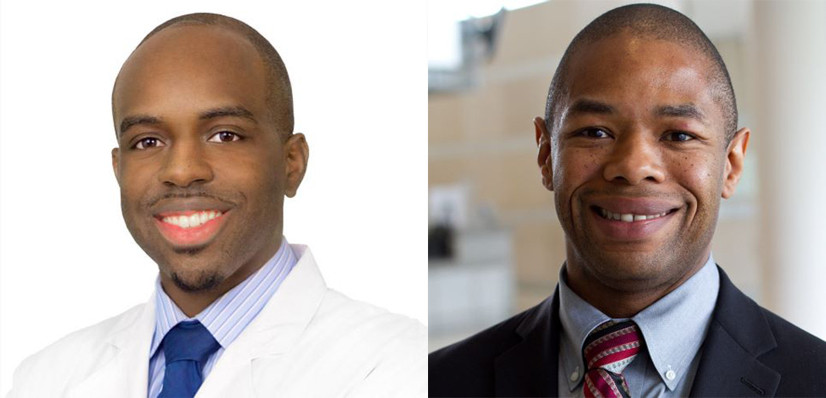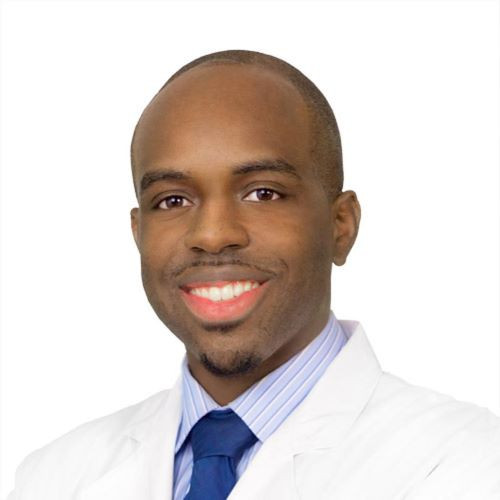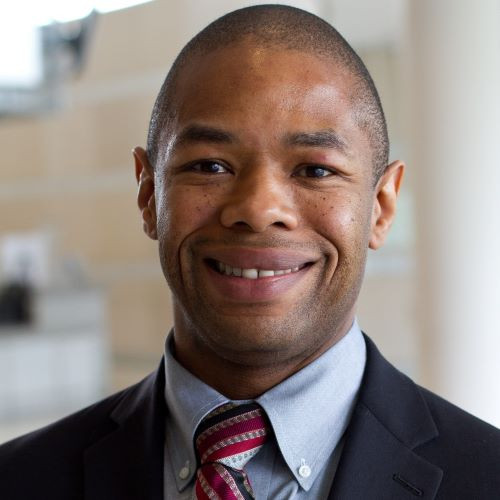
In celebration of Black History Month, we are pleased to share the stories—by way of interviews conducted via Zoom and email—of accomplished Black men and women in the health professions. Through this series of blog posts, we hope that fellow health professionals, both those practicing today and future generations, will be inspired by the remarkable contributions, significant achievements, and powerful insights of those we interviewed. In this final post of our three-part series, we catch up with Dale Okorodudu, MD, and Theodore Corbin, MD, MPP, two physicians devoting much of their energies to the critical work of mentoring young Black men in medicine. As pulmonary and critical care and emergency medicine physicians, respectively, these two men are on the front lines of caring for COVID-19 patients while also leading efforts to reshape the future of medicine to make it a more inclusive field for Black men.

Dale Okorodudu, MD, is Assistant Professor of Medicine specializing in Pulmonary and Critical Care at the University of Texas-Southwestern. He is the founder of DiverseMedicineInc and the Black Men In White Coats initiative. Dr. Okorodudu is the recipient of a 2019 Macy President’s Grant to support Black Men in White Coats, an organization aimed at increasing the number of Black men in medicine through exposure to role models, summits, and mentoring opportunities. Dr. Okorodudu also served as a member of the planning committee and as a participant in the 2020 Macy Foundation Conference on Addressing Harmful Bias and Eliminating Discrimination in Health Professions Environments. The annual Conference is a cornerstone of the Macy Foundation’s work, with the conference report serving as an important guide for recommended action.
Who or what were the most important elements to your success as a leader in medical education?
Mission and mentorship.
It is important for every individual to have a personal understanding of their own mission. One must understand the difference between a job and their work. Knowing your life’s work allows you to be more effective and make quicker and better decisions. After I came to an understanding of my mission and work, finding the right mentors was HUGE. This truly made the difference. One individual, placed in your life at the right time, can be a gamechanger.
What aspect of Black History is most relevant to your personal journey as a health professional?
Cohesiveness in empowerment. During Black History Month, people come together and unite around empowerment. I believe this concept is key for societal growth, regardless of how someone looks. Black History Month brings people together around the central theme of simply making things better. While we celebrate history, we are truly laying down the foundations for a better future. It is really about empowering every individual, no matter the race, to be their best.
What advice do you have for Black male medical students who may wish to pursue a leadership role in the future?
Walk your own path and live your own journey. As a Black male in the field today, it is likely you will be a first to do something. You will be a trailblazer; you will be a leader. When placed in this situation, it can be hard to find the path and, in many cases, you will be making that path. Understanding that, it is important that you decide now to live your own journey. While there are roadmaps, at times you will need to lay your own tracks. Be yourself in doing so and remember, just because you are the leader does not mean you cannot bring others with you. You will want mentors and sponsors to come along this journey.
Where are you finding hope that there will be meaningful change for Black Americans in 2021?
Honestly, right now I am finding tremendous hope in our recently released Black Men In White Coats documentary. The reviews and feedback have been amazing. So many people have shared how the viewing experience has been transformative for them. This gives me great hope.

Theodore Corbin, MD, MPP, is Professor of Emergency Medicine at the Drexel University College of Medicine. He is also Associate Dean for Community and External Affairs at the College of Medicine and serves as Medical Director of the Healing Hurt People program, a hospital-linked trauma-informed intervention strategy that identifies victims of intentional injury and provides services that address racial trauma and the social determinants of health. Dr. Corbin served as a participant in the 2020 Macy Foundation Conference on Addressing Harmful Bias and Eliminating Discrimination in Health Professions Environments. The annual Conference is a cornerstone of the Macy Foundation’s work, with the conference report serving as an important guide for recommended action.
Who or what were the most important elements to your success as a leader in medical education?
Generous role models who taught me about the rewards of paying it forward played a role in my success.
Understanding my unique role as a provider of color, especially as a proud graduate of Lincoln University, the first HBCU, has also impacted my success.
What aspect of Black History is most relevant to your personal journey as a health professional?
The ways that Black people have come together in support of excellence—HBCUs, Black fraternities, public institutions like Harlem Hospital.
What advice do you have for Black medical students who may wish to pursue a leadership role in the future?
Recognize the privilege of being in medicine. Speak out against injustice and inequity whenever and wherever you see it, even if you get pushback. “Make good trouble” in medicine. I have always encouraged students and residents to focus on what is best for the patient and listen to them. You learn so much, which fuels you to want to do more and do more.
Where are you finding hope that there will be meaningful change for Black Americans in 2021?
Black Men In Medicine. Attention of the National Academy of Medicine on promoting the success of Black people in the health professions. A movement to right the wrongs of Flexner. The importance of Black physicians to Black Lives Matter. My personal work to heal the wounds of racial trauma through Healing Hurt People, a violence intervention program. Mentoring Black medical students, our future leaders.
It is a time for a racial reconciliation in America that for too long has gone ignored.
Please feel free to add any additional comments you wish to share.
I am…
- an emergency medicine physician
- Associate Dean of Community and External Affairs at the College of Medicine
- Co-Director of the Center for Nonviolence and Social Justice, a collaboration between the College of Medicine and the Dornsife School of Public Health
- a son, a brother, a husband, a friend
- and I am…a Black man living in America
I bring all these pieces of me together, intersecting with my life, my work, and my world. I feel I have more growing to do and I look forward to it. I am privileged to take care of people, educate people, and study how to improve the health of people. I take it very seriously. Though I am not immune to the structural issues that still plague us, I am committed to push the next generation of health care providers to be better than the former. I want to inspire Black men and women to pursue a rewarding career in academic medicine. We need them. I will continue to speak truth and do what is necessary to achieve health equity in every sphere and every level.